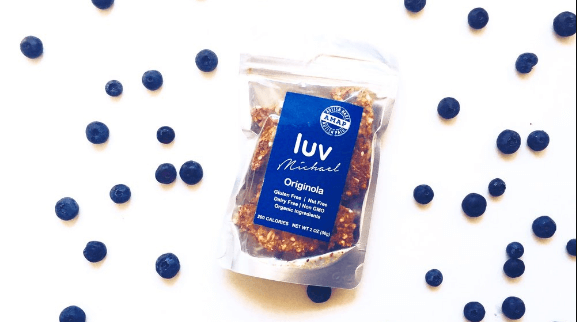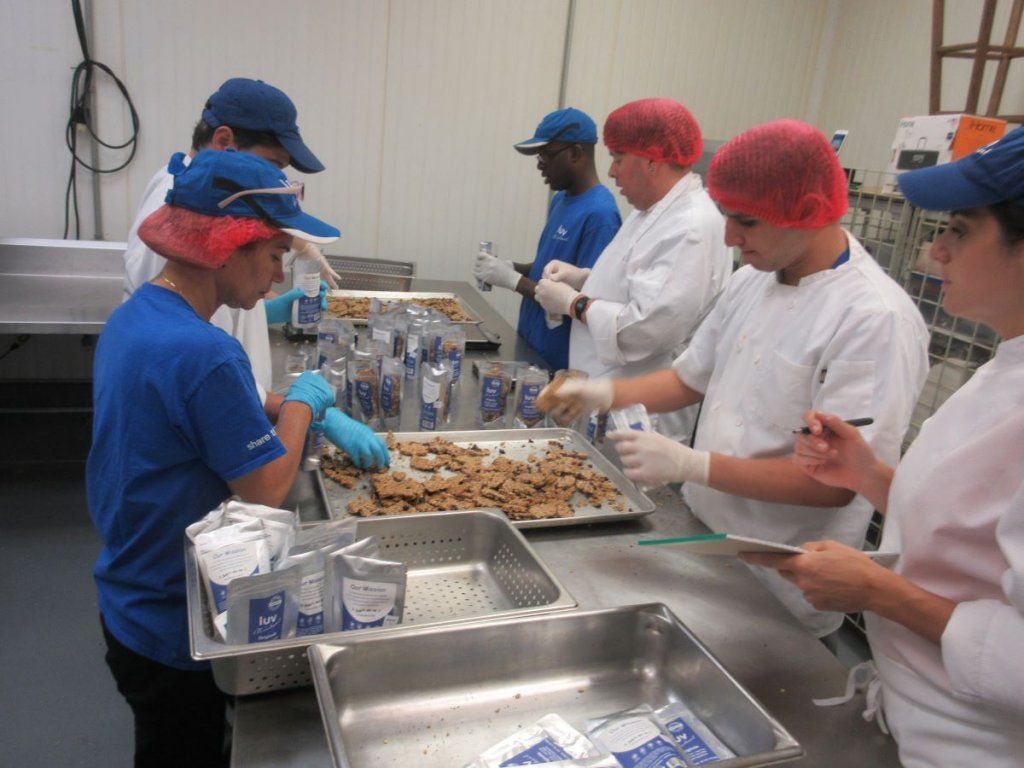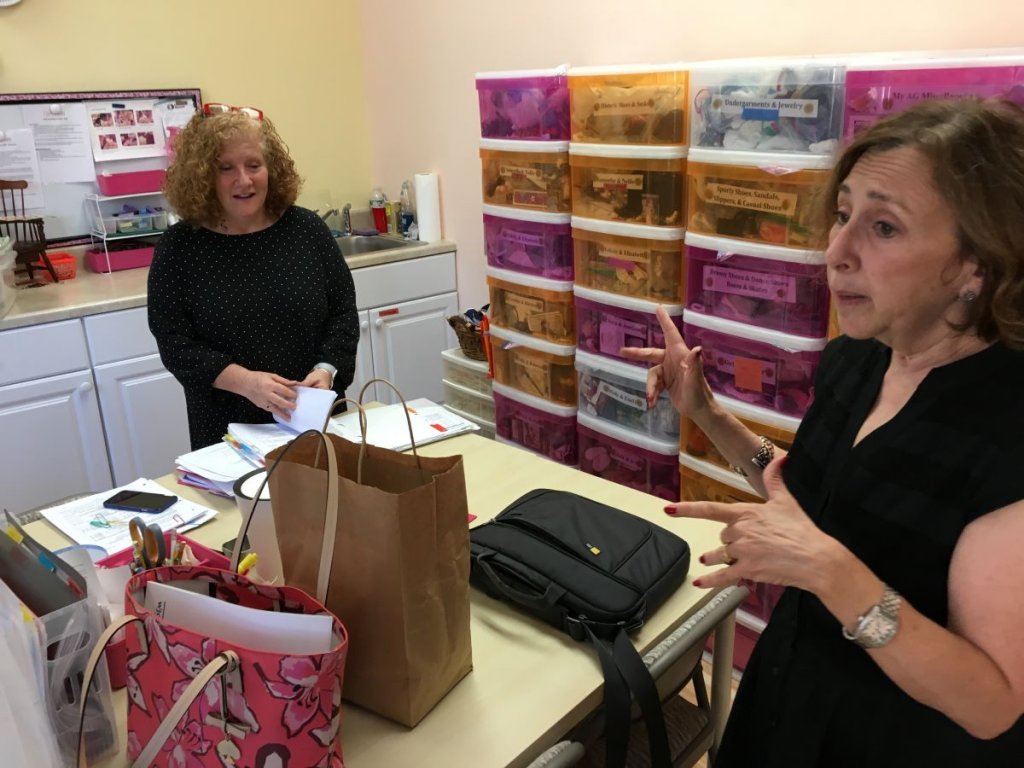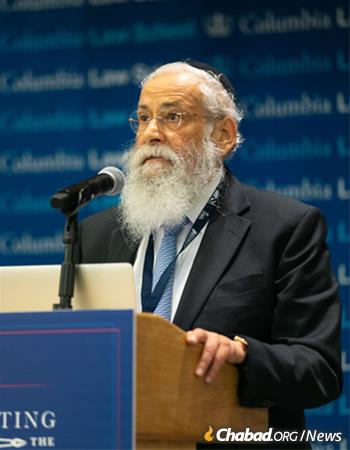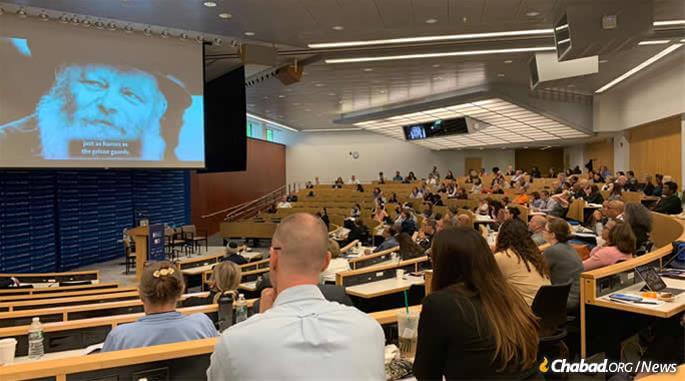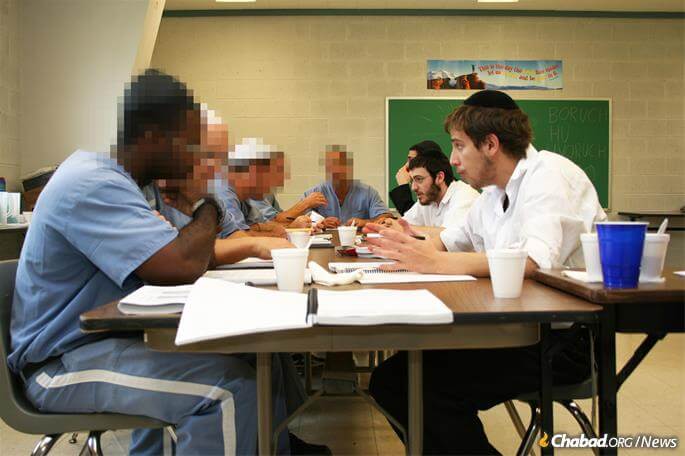Luv Michael
42 Walker Street (Tribeca) New York, NY 10013
(646) 661-1224
luvmichael.org
Name of contact: Founder-Lisa Liberatore
Lisa cell: 917-699-5118
“A 501c3 established in the home of the founders in 2015 to train, educate and employ people with autism. In 2016, the program moved to an entrepreneur space (industrial kitchen) in Long Island City with son Michael and one other person to they can make and package Luv Michael granola. The program, now much larger, sells to several well-known stores and is in the process of moving from Long Island City to Tribeca in Manhattan. Participants do not pay for the program. They receive a paycheck for their work. The founders handle most costs with grant support helpful as well. The goal is to have for-profit and not-for-profit divisions.”
My 2018 Visit (Keep Reading for 2019 Updates!)
Luv Michael is the first job site I visited and in many ways, was the inspiration for this project. Dr. Liberatore reached out to me at the suggestion of a mutual friend. I went to visit the program’s rented kitchen and classroom space in Long Island City, NY. I observed the entire granola making process and learned that Liberatore needed to hire many professionals for both the vocational training component, and for recipe development (“granologist”), packaging, etc. Participants combine ingredients, bake and measure out the correct quantity, weight and consistency (not too crumbly) and package it. During the visit, I asked if Dr. Liberatore knows of similar programs and job sites specifically geared toward training and employing people with disabilities. She referred me to the Facebook group, Autism, Entrepreneurship. This was a useful starting point for identifying businesses and tuning in to the concerns of parents expressed in the discussion. I have kept in touch and recently updated the Lessons Learned section.
Updated provided by Luv Michael August, 2019
Luv Michael is a Non-Profit 501c 3organization that produces high quality organic, gluten-free, and nut-free granola without all the harmful chemicals and toxic allergens. The company was founded in 2015 by Lisa Liberatore, MD and her son Michael with the goal of providing meaningful employment and on the job training to those diagnosed with Autism.
Michael Kessaris is the inspiration for Luv Michael Granola. Michael’s new line of gluten-free and nut-free granola is taking its first delicious bite out of the fast-growing natural foods niche with distribution in the fifteen Manhattan locations of Fresh & Co. stores. In addition to meeting consumer demands for a high quality snackable granola in the growing market for nut-free and gluten-free foods, Luv Michael is part of an inevitable wave of career-finding solutions for those, like Michael, living with Autism.
For Michael and his team, producing the highest quality gluten-free and natural products was a logical tie-in; healthy dietary alternatives have been found to be beneficial to many with Autistic symptoms. Providing training and income for others on the Autistic spectrum became their mission. With the disability affecting 1 in 68 births and rising, employment for the maturing Autistic population has become an increasingly significant challenge for many. The success of Luv Michael is even more compelling, considering that employment for those on the Autistic spectrum is lowest among those with disabilities.
Finding a career was not easy for Michael, a Port Washington, NY native. Despite his love of cooking, Michael was unable to enroll in culinary school without a high school diploma. Michael’s parents, both physicians, Lisa Liberatore, MD and Dimitri Kessaris, MD, helped create the food-based business so that their son and others with Autism would not be a burden on society or limited in their potential to lead happy and productive lives. They started Luv Michael under the parent company, Indigo Life, which represents a commitment for doing even more for the Autistic population.
The idea was born to make a healthful quality product that could provide income and a career for both Michael and other individuals with Autism. Luv Michael provides a therapeutic employment environment, which caters to the special needs of the employable Autistic person. Luv Michael now employs over 10 full-time granologists that provide fresh granola to Starbucks, JetBlue, Fresh and Co, D’Agostino Supermarkets, Gristedes Neighborhood Grocers, Wild By Nature and over 60 other retailers.
The Liberatore and Kessaris family are working with autism specialists to develop an entire curriculum based upon the New York State food handler’s license and are dedicated to not only teach cooking and food safety but also all aspects of a small business including sales, marketing and customer service and distribution.
Luv Michael’s mission is to “provide a meaningful culinary vocation for the Autistic population and to produce exceptional gluten-free and natural products.” So far, success is sweet for Luv Michael.
Luv Michael’s story is about to take a huge leap forward with the opening of our higher-capacity kitchen and learning center in the Tribeca section of New York City. Luv Michael’s new headquarter is expected to open in October 2019. In this dedicated space, granologists will learn their trade and take part in the manufacturing process. Most importantly, they will grow as workers and members of the working world. The skills they gain here will most assuredly be used for many years to come in future jobs and careers
Founder Dr. Liberatore Shares Observations/Lessons Learned:
- Legal Fees Are Enormous! (very important to set up each system and mechanism properly; last year, paid $10,000 now to get nonprofit registered in different states (we will have a nonprofit and a for profit division—nonprofit is training, curriculum, special education teacher salary, etc.)
- How to Work and Not Lose Social Security Benefits? “The System Is Barbaric! –this is why parents don’t want their children paid—don’t want them to jeopardize SS benefits. “I went down to SS—if he works, the $700 meant for living (residence), food, clothing, etc. automatically has $85 deducted off the top, then for each dollar he makes, they deduct $.50—to incentivize him to work. And the mom must go in person so I would have to miss a day of work.” “how do I pay them when parents don’t want them to get paid.” (I bring 5 one dollar bills and tape it to their work stations…so they “see” they are getting paid for their work.”
- Costs—we have funded it (we reason our other son is going to NYU and we pay the tuition; starting this program is training for 10 with disabilities)
- When trying to make a financial sustainable business you need to focus equally on the business as you work on the mission.
- You need experts in the field to really commit to your project.
- You need to try and keep overhead as low as possible but also spend where it counts. For us, it was recruiting a great special education teacher with many years of successful teaching the autistic population and is willing to think out of the box.
- You must believe in the mission fully because it will be a costly project to finance before it becomes financially viable- that means years of hard work and doubts!
- Others will say you are crazy
- Stay true to the reason you started it and don’t compromise. We want a healthy and tasty product and also to provide education and enrichment to our granologists.
- That is counter to the business world where they want to make a cheap and unhealthy product, mass produced and employ people for the low skilled jobs without future growth and stimulation.
- When you do it “right,” people get it and start helping you for low cost or pro bono.
- Protect your brand and don’t try to grow too fast. You need your ducks all lined up and the project completely worked out and written down before it can be replicated.
- This next year will show whether we are sustainable or not as we move into our own space, grow our snack line and procure more outside funding.
Updated on : October, 2019
Luv Michael Co, now in its fourth year of business, recently opened a 3,000 square-foot, state of the art commercial space in Manhattan’s Tribeca neighborhood. It is outfitted as both a comprehensive learning and training center as well as a high capacity commercial kitchen where young adults with autism will train for the New York State food handler’s license and produce the company’s product – organic, all-natural and gluten-free granola.
Currently, Luv Michael Co. employs 10 ‘granologists’ that provide fresh granola to Starbucks, Fresh & Co, D’Agostino Supermarkets, Gristedes Neighborhood Grocers, Wild by Nature, totaling over 60 retailers in the greater New York City area. A replication expansion project at the Greek Orthodox Church of The Hamptons, employs 10 more. Luv Michael Co. will soon begin producing its products for JetBlue.
